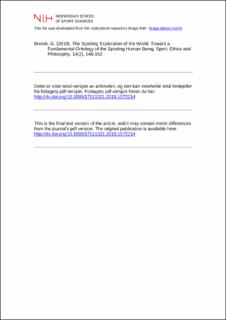| dc.contributor.author | Breivik, Gunnar | |
| dc.date.accessioned | 2020-07-08T06:38:13Z | |
| dc.date.available | 2020-07-08T06:38:13Z | |
| dc.date.created | 2019-05-12T20:01:28Z | |
| dc.date.issued | 2019 | |
| dc.identifier.citation | Sport, Ethics and Philosophy. 2019, 14(2), 146-162. | en_US |
| dc.identifier.issn | 1751-1321 | |
| dc.identifier.uri | https://hdl.handle.net/11250/2661328 | |
| dc.description | I Brage finner du siste tekst-versjon av artikkelen, og den kan inneholde ubetydelige forskjeller fra forlagets pdf-versjon. Forlagets pdf-versjon finner du på tandfonline.com / In Brage you'll find the final text version of the article, and it may contain insignificant differences from the journal's pdf version. The definitive version is available at tandfonline.com. | en_US |
| dc.description.abstract | My perspective in this paper is to look at sport and other physical activities as a way of exploring and experimenting with the environing world. The human being is basically the homo movens – born to move. Furthermore, the homo movens is the homo ludens – an active and playful being that explores the world in different ways and in a variety of environments. The ludic exploration of the world starts with children’s play and goes all the way up to full-blown versions of rule-based sports, then on to various physical activities into old age. My point of departure is Heidegger’s notion of being-in-the-world which suggests that humans are never isolated individuals but are always in a deep way connected with a ‘world’. The ‘world’ of sport comes in different versions. By use of a phenomenological approach I try to show that the sporting exploration of the world takes place in four ontologically different dimensions or ‘worlds’. Here I distinguish between individual sports, encounter sports, team sports and nature sports, and I argue that the I-Me, I-You, I-Society and I-Nature relations that are exemplified in these four types of sports have different ontological characteristics. While the discussion is inspired by Heidegger’s ideas I argue that the ways of ‘worldmaking’ in sport are more ontologically diverse than Heidegger opened up for. Heidegger described the relation of Dasein to itself and to other human beings and argued that we deal with the environment in a practical and a theoretical mode. I expand on this and present a more coherent picture of four different dimensions in the human being’s sporting exploration of the world. | en_US |
| dc.language.iso | eng | en_US |
| dc.subject | philosophy | |
| dc.subject | fundamental ontology | |
| dc.subject | Heidegger | |
| dc.subject | play | |
| dc.subject | sport | |
| dc.title | The Sporting Exploration of the World: Toward a Fundamental Ontology of the Sporting Human Being | en_US |
| dc.type | Peer reviewed | en_US |
| dc.type | Journal article | en_US |
| dc.description.version | acceptedVersion | en_US |
| dc.source.pagenumber | 146-162 | en_US |
| dc.source.journal | Sport, Ethics and Philosophy | en_US |
| dc.identifier.doi | 10.1080/17511321.2019.1572214 | |
| dc.identifier.cristin | 1697226 | |
| dc.description.localcode | Seksjon for kultur og samfunn / Department of Cultural and Social Studies | en_US |
| cristin.ispublished | true | |
| cristin.fulltext | postprint | |
| cristin.qualitycode | 1 | |
